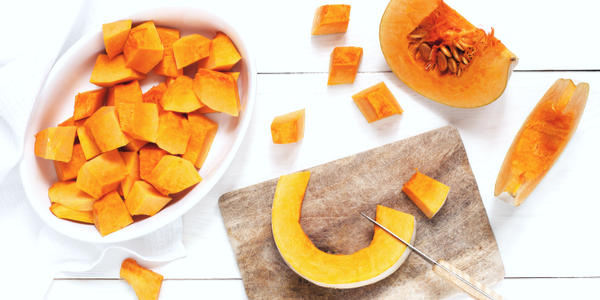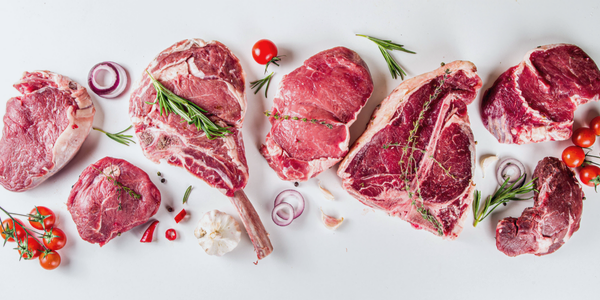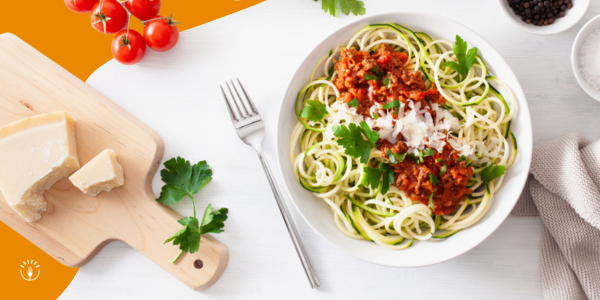
Is pumpkin healthy? Pumpkin benefits go beyond being fun carving fruits for the Halloween holiday. The health benefits of pumpkin extend from the seeds to the skin.
Read on to learn more about pumpkin nutrition, including healthy fun facts about pumpkin!
Does Pumpkin Have Health Benefits?
What is pumpkin good for in the body? With its curious orange exterior, one might wonder, "What does pumpkin do to your body?"
The following health benefits prove pumpkins are good for more than just carving around the Halloween season.
Rich In Vitamin A
Just one cup of cooked pumpkin offers an astounding 245% of the reference daily intake (RDI). Vitamin A acts as an antioxidant, which means it protects the body from cell damage.
According to research, this may mean pumpkin is associated with skin and eye health, as well as protection against other diseases and conditions.
High In Nutrition
Vitamin A might get most of the attention, however pumpkins contain other nutrients as well. Nutrients such as vitamin C and potassium add to pumpkin's impressive nutrient profile. These vitamins and minerals link pumpkin to many health benefits.
High in Hydration
Pumpkin is a food that is nutrient- and water-rich. Being 94% water, it is one incredibly hydrating orange squash.
Low in Calories
Along with vitamins and minerals, pumpkins are low-calorie. In just one cup of cooked pumpkin, there are less than 50 calories.
Low in Fat
While hard to believe a cup of pumpkin contains less than 1 gram of fat. Especially if trying to naturally lower overall fat and calorie intake, pumpkins make many weight-loss food lists.
Adds to Fiber Intake
With 3 grams of fiber to the cup, pumpkin packs a punch. Americans, on average, have a low fiber intake and fiber is considered a nutrient of concern. Fiber from pumpkins can fortify the diet and, in particular, improve digestive health.
Versatile and Easy-To-Add
Beyond being delicious, pumpkin can be used in a variety of ways. It plays to both sweet and savory flavors, making it a fantastic addition that typically elevates the following:
• The infamous pumpkin pie
• Custards
• Pancakes
• Roasted vegetables
• Soups
• Pasta dishes (i.e. tortellini, ravioli)
• Asian cuisine (i.e. curry)
• Desserts and dessert drinks (i.e. pumpkin spice lattes, pumpkin cheesecake)
Many canned or pre-cut varieties are also available. Although, it is important to check the nutrition label as not all pumpkin products are created equal. Opt for 100% pumpkin products that have little to no added sugar.
Pumpkin Health Facts
As mentioned above, from the seeds to the skin, pumpkin can be used in many ways. Beyond putting pumpkin in delicious recipes during the fall season, increase nutrition and health benefits by incorporating puree and other pumpkin parts year-round.
May Boost Immunity
Along with an impressive vitamin profile, pumpkin may boost immune protection. Research suggests that vitamin A plays an important role in immune health and attacking infections. Pumpkins are also higher in vitamin C, which is known for helping the improve immune system and wound healing.
May Improve Eyesight
Pumpkin contains many nutrients linked to good eye health. These compounds include:
• Vitamin A (beta-carotene)
• Lutein
• Zeaxanthin
In fact, pumpkin is thought to be one of the best sources of lutein and zeaxanthin. These two compounds lower the risk of age-related macular degeneration (AMD) and cataracts.
Can Aid In Weight Loss
With its nutrient density and low calorie count, pumpkin can help people keep at a healthy weight. As a weight-loss-friendly food, pumpkin offers quality carbohydrates plus a lot of nutrient value. It’s also a source of fiber, which helps curb appetite by creating a feeling of fullness during digestion.
May Boost Heart Health
A variety of vitamins and minerals means that pumpkin is also great for heart health. Especially high in potassium and magnesium, pumpkin has the power to help maintain a stable blood pressure.
It has even been implicated in reducing strokes, decreasing cholesterol levels, and lowering the risk of heart disease overall.
Use In Cases of Egg Allergy
Baking with an egg allergy can feel complicated. Luckily, pumpkin puree can take the place of eggs in many baked goods (just add a 1/2 teaspoon baking powder for each egg that is replaced with puree).
Especially for moist bakes, pumpkin provides a subtle flavor and plant-based nutrients.
Contains Compounds For Healthy Skin
Pumpkin health benefits for skin include high vitamin A and vitamin C content. As mentioned above, these antioxidants benefit the body by acting as antioxidants that protect cells.
For skin, pumpkin can by contributing vitamin C for collagen production, and collagen keeps skin strong and healthy.
Eat Pumpkin For Improved Prostate And Bladder Health
Pumpkin seeds may have health benefits for the prostate and bladder. Studies show that consumption can reduce symptoms and improve quality of life in cases of benign prostatic hyperplasia (BPH). This condition causes the prostate gland to enlarge and creates problems with urination.
A study on overactive bladders found that just 10 grams a day in both men and women improved urinary function.
Use Can Help Lower Food Waste
Post-Halloween pumpkins often end up in a landfill. By purchasing an edible pumpkin variety, one can increase health benefits while also benefiting the environment.
Non-toxic, washable paint on edible pumpkin varieties means that pumpkins can be washed and eaten after the holiday. Local opportunities, such as a community pumpkin smash, helps make composting fun!
16. Store for Several Weeks
Pumpkins, when properly stored, can be kept for a month or longer. There are even some techniques, often referred to as "curing" or an "oil-buff", that make pumpkins capable of being stored for longer periods of time (up to three months).
This means that their healthy effects can be enjoyed for even longer without worrying that they will go "bad".
Do Pumpkin Seeds Have Any Health Benefits?
Pumpkin seeds are not only edible, they are nutritious and delicious. They also go by the name pepita, and the oil that is pressed from them has been used for years. In Mexico, pepitas have been used to make thick sauces, mole verde, and more.
Use As an Alternative Thickener
When in need of a baking alternative, incorporate crushed pumpkin seeds or pumpkin puree. Adding pumpkin seeds to a recipe can make the ingredient mix thicker. It also adds plenty of nutrients and extra flavor while keeping the calorie count lower than in cases where oil or butter is added.
Add Antioxidants to a Dish
Pepitas can be sprinkled on top of desserts or other dishes seamlessly. Easy to add, pumpkin seeds elevate many dishes like fingerling potatoes. They also add antioxidants like vitamin E and may even reduce the risk of certain cancers according to recent research.
Make Snacks Satisfying
Pumpkin seeds can easily be added to granola or trail mix. They are not only a delicious addition, as they leverage the protein, healthy fat, and other nutrients to snacks.
May Benefit Reproductive Health
Pumpkin health benefits during pregnancy and conception may include improved sperm quality. The seeds can contribute high levels of antioxidants, vitamins, and minerals that keep testosterone levels where they should be. This is thought to overall benefit fertility levels and reproductive function, especially when it comes to men.
May Promote Better Sleep
Commonly associated with turkey, tryptophan is thought of as the compound that makes people sleepy after Thanksgiving. However, tryptophan is essential to many body processes.
Pumpkin seeds are a natural source, and eating about 7 ounces of pumpkin seeds is thought to help achieve optimal levels of tryptophan for a good night's sleep.
The Last Word on Wicked-Cool Pumpkins
The benefits of pumpkin extend all the way down to the seeds inside. Beyond being versatile, it is a vitamin and mineral-rich fruit that is full of possibilities.
Pumpkin is magical in the Halloween season, but can be used to fortify the diet with important nutrients year-round!
References:
Pumpkin seeds pack a healthy punch. American Heart Association. Published October 25, 2018. https://www.heart.org/en/news/2018/10/25/pumpkin-seeds-pack-a-healthy-punch.
Brown MJ. Top 11 Science-Based Health Benefits of Pumpkin Seeds. Healthline. Published September 24, 2018. https://www.healthline.com/nutrition/11-benefits-of-pumpkin-seeds.
Cox J. Healthy Baking Alternatives. Academy of Nutrition & Dietetics. Published March 2021. https://www.eatright.org/food/planning-and-prep/cooking-tips-and-trends/healthy-baking-alternatives.
Real Food Encyclopedia | Pumpkins. FoodPrint. GRACE Communications Foundation. https://foodprint.org/real-food/pumpkins/.
Lawler M. All About Pumpkins: Nutrition, Benefits, Recipes, Side Effects, and More. Everyday Health. Published October 29, 2020. https://www.everydayhealth.com/diet-nutrition/pumpkins-nutrition-benefits-recipes-side-effects-and-more/.
Newgent J. Egg Alternatives. Academy of Nutrition & Dietetics. Published April 17, 2019. https://www.eatright.org/food/nutrition/vegetarian-and-special-diets/egg-alternatives.
Raman R. 9 Impressive Health Benefits of Pumpkin. Healthline. Published August 28, 2018. https://www.healthline.com/nutrition/pumpkin.
Sass C. 7 Benefits of Pumpkin Seeds, According to Nutritionists. Health. Published November 3, 2020. https://www.health.com/nutrition/pumpkin-seeds-benefits.







